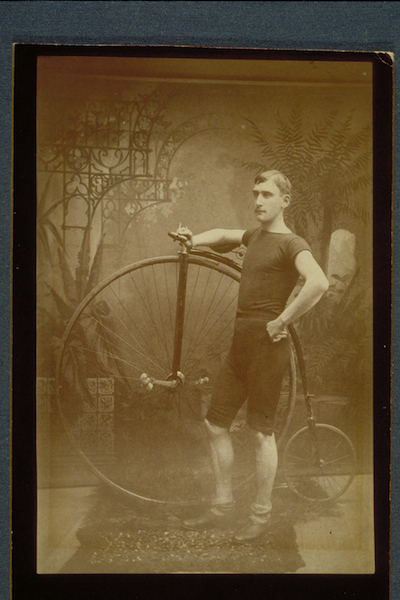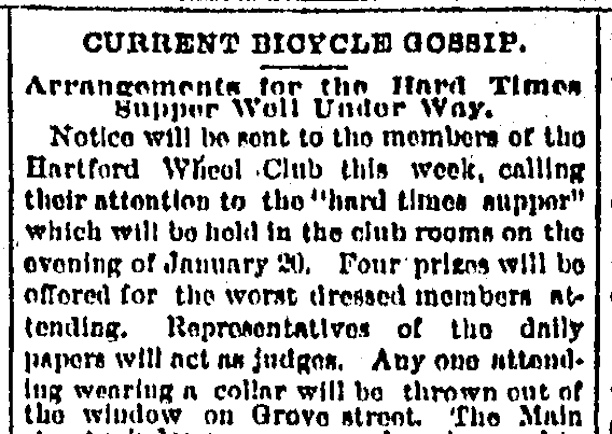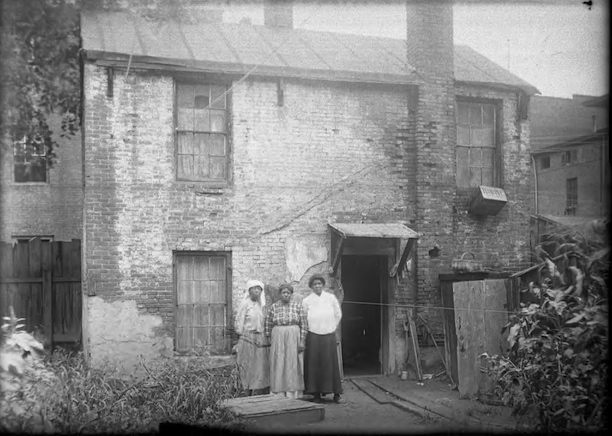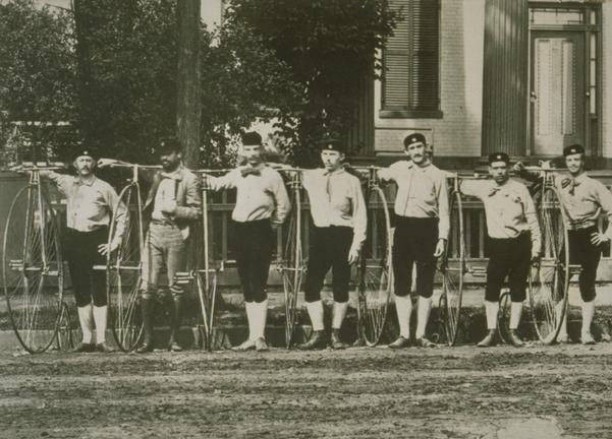By Steve Thornton

World Traveler and lecturer , W.H. (Billy) Rhodes, Charter Member Hartford Wheel Club, 1886 – Connecticut Historical Society
In early 1893, the boys at the Hartford Wheel Club had a great idea: they would throw a party and dress up like poor people! The members of the club themselves, of course, were not poor; being a dues-paying Hartford Wheel Club member was an expensive hobby. Back then a cycle cost the modern equivalent of $3,800, half a year’s wages for an average workman. (Albert Pope manufactured these “penny farthings,” single high-wheeled vehicles, at his factory on Washington Street.) The Wheel Club took their cycles to races in other states, which often meant two- or three-day treks. Since the work week typically lasted 6 days (and at least 60 hours), only the leisure class found spare time and money to compete.
The party, it seemed, was the perfect occasion for Wheel Club members to reaffirm their place in the social order, and so on January 20, 1893, they held their “Hard Times Supper” at their club rooms on the corner of Main and Grove Street. The club demanded a strict dress code for the Hard Times event. “Anyone wearing a collar will be thrown out the window,” the invitation read. (The detachable celluloid collar was a formal accessory, and only manual laborers walked around without them.) The rules forbid cigars and cigarettes as well. Most of the poor and unemployed were not buying smokes when they could not feed their families. Party-goers smoked crude corn cob pipes instead.

Detail from The Hartford Courant article “Current Bicycle Gossip: Arrangements for the Hard Times Supper Well Under Way,” January 10, 1893.
The party’s organizers designed the bill of fare to fit the club’s poverty theme as well. It is likely the Wheel Club members regularly dined on steak and champagne, but for this meal they were only offered hardtack, dried herring, cold pork, and cider. The Wheel Club affair could not compete with spectacles of the very rich, of course; such as the dinner party Mrs. Stuyvesant Fish of New York hosted for her dog during which the pet wore a diamond collar worth $390,000 in today’s dollars. But what Hartford’s young men lacked in ridiculous ostentation, they made up for in mean-spirited fun.
Hartford in the Gilded Age
The panic of 1893 was no joke, however. It helped give rise to an era of slums, sweatshops, and widespread poverty and adversely affected the greater part of Hartford’s population. Massive unemployment meant more hobos roaming the city, which spurred the Rev. John J. McCook to lobby for restricting “tramps” to a limited section of Hartford where the almshouse resided. Women unable to find work often began selling their bodies for money. (During this period Hartford was home to 12 brothels and roughly 400 prostitutes.) The Irish immigrant population lived in poverty in the east side neighborhood known as “Pigville.” The African American population was small, but widespread discrimination meant that black families suffered the worst housing and health conditions of any ethnic or racial group in the capital city.

Three African American women in front of east side tenements, Pearl Street, Hartford – Hartford History Center, Hartford Public Library
This was life in Hartford during the “Gilded Age,” a term coined by Mark Twain and the title of his first novel, co-authored with Charles Dudley Warner. The book served as an exposé of the land speculation, corruption, and excess wealth of the period.
“Where are the poor of Hartford?” Mark Twain wrote when he first visited the city. “I confess I do not know. They are ‘corralled,’ doubtless—corralled in some unsanctified corner of this paradise whither my feet have not yet wandered I suppose.”
By the time Twain moved to Connecticut, The Gilded Age: A Tale of Today had been published and a stage play based on the book reached theaters in New York and Hartford. Twain championed labor unions as a means to balance the wealth disparity between the “1 percent” of the day and everyone else.
As it turned out, however, even the wealthy Hartford Wheel Club succumbed to the economic hardship of the period. The club failed to pay their rent in October 1899 and their landlord ultimately evicted them and seized their property.
Steve Thornton is a retired union organizer who writes for the Shoeleather History Project









